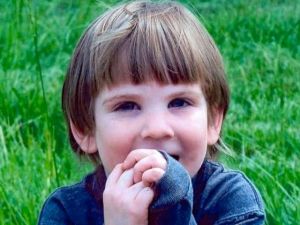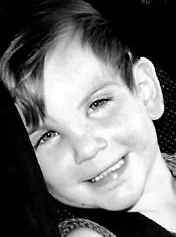
A color photo of Marcus Fiesel. smiling
I remember the first time I became aware of it.
It’s been nine years now. Marcus would be twelve this year. A neighbor called him “an awesome little guy.”
He was three years old. He loved Bob the Builder, flowers, bubbles. His mother was being beaten by her boyfriend and when the police visited, they saw the house was filthy, was infested with fleas, smelled of feces.
His mother was so exhausted and depressed that a neighbor saw her openly weeping. Marcus had mysterious cuts and bruises. He was brought home by the police who found him wandering in busy traffic. His mother told the officers that she couldn’t take care of her three children any more. She handed them over to the state. She was trying to do the right thing for her children. She was trying to get them the care they deserved. She was making a smart choice, trying to save them from her abusive boyfriend.
Marcus was Autistic. He went to a school for children with disabilities and support needs. He was very active and had been caught crawling out of windows. He was the sort of child that parents call “a handful,” usually as they laugh lovingly . . . if they are not too abused and worn out to be able to laugh any more. His foster parents were poorly chosen.

a black and white photo of Marcus Fiesel, smiling.
David and Liz Carroll were keeping secrets that would have precluded them from being allowed to serve as foster parents if they were known. David had a medical record that would have excluded him. And the couple had another adult living in the home, Amy Baker. The Carrolls kept her a secret because they feared Lifeway for Youth would not approve of their polyamorous relationship and no longer allow them to be foster parents. In June, David was arrested for domestic violence. The charges were dropped and he never reported the arrest to Lifeway (although he was supposed to.)
The relationship between David and Liz was already rocky. David had left Liz because she wanted to be a foster parent and he didn’t. When he returned to Liz, he brought his new girlfriend, Amy, with him and forced Liz to accept an open relationship in exchange for him accepting foster children. Marcus’ mother thought she was doing the right thing when she let go of her children but Marcus ended up going to a home every bit as dangerous and unstable as the one he had left.
I would later learn that Marcus was a rare case — he was not abused and murdered for being Autistic. His foster parents treated all their foster children the same way. Marcus just happened to be the one who died. At the time, I didn’t yet know about the pattern of murders of Autistic children. Marcus was the first child I mourned. He haunts me still. I will always mourn Marcus.
David and Liz Carroll used to wrap their foster children up in blankets and duct tape and prop them in a playpen in the closet when they left town. Bradley Leach was in their care at the same time that Marcus Fiesel was. Bradley was wrapped in blankets and tape and left for hours. Years later, Bradley has intense nightmares in which he relives the trauma. Bradley is ten years old now. It could have been him instead of Marcus.
When David and Liz returned home from a weekend out of town, they unwrapped the blankets and found Marcus dead inside. He had overheated in the blankets on those hot August days. He was gone.
I followed the case with anguish. Marcus was Autistic so the whole thing really punched me in the gut. That is a metaphor, but it felt like a real punch to me. My friends already knew the pattern. It was new to me. The grief was raw and I had no idea that there was more to follow. I did not realize that three months later twelve year old Ulysses Stable would have his throat slit by his father. Or that a year later two year old Maxwell Eyer would be beaten to death by his father.
I couldn’t have foreseen teenaged Calista Springer, chained to her bed and left to burn when her family evacuated their burning home. Or another teenager, Courtney Wise, who was starved to death that same month. Or three year old Ethan Scott Kirby beaten to death by his mother’s boyfriend, half a year after the deaths of the two girls.
Do you feel overwhelmed yet by all this violence? If you have a hard time reading, know that I am having a harder time writing. Please honor my pain by continuing to read. Please honor these dead children — and the hundreds more . . . thousands more . . . who were killed. Autistic children. Children like me. Perhaps children like you. Or children like your children.
The news stories kept coming and coming. Gassed. Decapitated. Thrown into the sea. Thrown off building ledges. Smothered in blankets. Fed bleach. Buckled into the car and driven into water to drown. And still the murders kept happening, the deaths kept coming, the grief was never-ending. So many lives snuffed out. So many futures ended by the very people who were meant to be helping those futures dawn as fruitfully as possible.
I can’t count them. Don’t make me count them. There are just too many. Their lifeless bodies pile up in my thoughts. The world feels a strange and hostile place. With each new murder, I forget the love and acceptance I have encountered and curl into a ball under a blanket, weeping for another life gone. I die a little each time one of us is killed. I am diminished, the snuffing of their lives chipping another piece from me until I fear there will be nothing left.
I have learned over the years that I must never read the comment sections on these news stories. Inevitably, predictably, the justifications come.
People comment on the news stories, saying we should not judge the parents who murder their children. They say we cannot possibly know how difficult it is to raise an Autistic child. “Walk in their shoes,” the commenters say, “and then you will understand.”
I do not want to walk in the shoes of murderers. I do not want to ever understand how a parent can take their child’s life.
But is anyone willing to walk in our shoes? Does anyone want to think about what it would be like to have a particular neurotype and see people like you being murdered by their own parents? Does anyone want to think about how hard it would be to go through those stretches where a murder of someone like you is reported every month, often more frequently? Can you possibly walk in the shoes we wear when we make the mistake of reading those comment sections only to find dozens of people agreeing that folks like us are such a terrible burden that it’s understandable that our own parents would want to kill us?
These are not easy shoes to walk in. They are too small — they are always too small and they pinch and bind and cut into our feet so deeply that we bleed. The blood runs down inside the shoes where you can’t see it and people see the limping and tell us not to be such drama queens.
How are we supposed to react to these murders? What would be the acceptable, calm, well-measured response to the killings?
How would you respond if you kept seeing a pattern of people like you being killed by the people they should have been able to trust more than anyone in the world?
Because it is a pattern. I couldn’t see it all those years ago when I first mourned Marcus. But I’ve watched the subsequent killings, year after year and the patterns become clear. And I die a little bit more each time one of us is killed.




